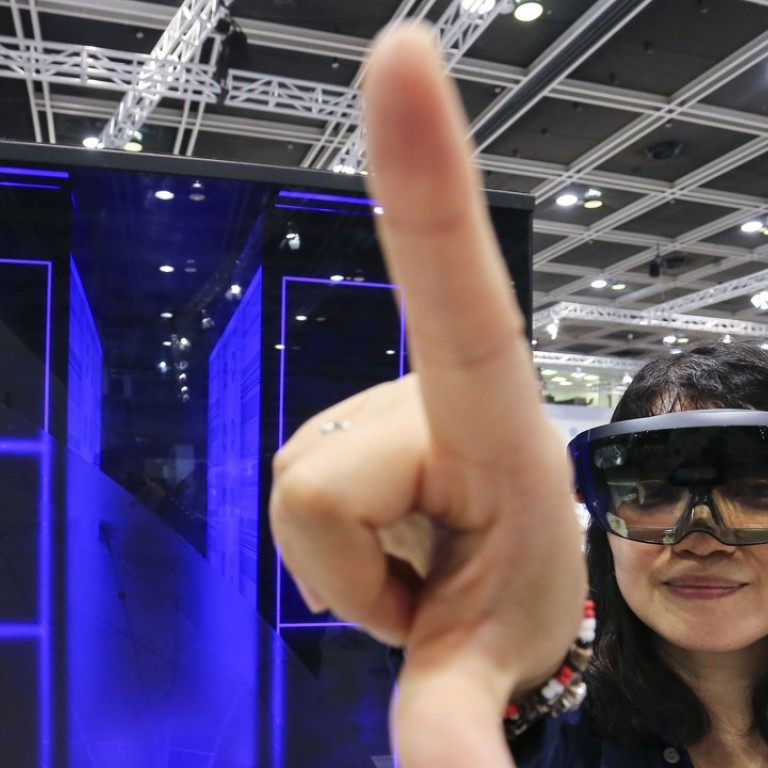
Local and national innovations draw thousands to Hong Kong’s InnoTech Expo
Exhibition runs until Monday at the Hong Kong Convention and Exhibition Centre
A showcase of everything from student inventions to the state’s aerospace infrastructure, the second annual InnoTech Expo has attracted tens of thousands of visitors so far and is expected to receive many more over the weekend before closing its doors on Monday.
The week-long fair features around 130 exhibits, including a model of the Liaoning aircraft carrier, virtual reality game booths, cutting-edge inventions and technologies, all developed in Hong Kong or on the mainland.
Our Hong Kong Foundation, which is headed by former chief executive Tung Chee-hwa, organised the event at the Hong Kong Convention and Exhibition Centre, with input from state bodies like the Ministry of Science and Technology of the People’s Republic of China. Some exhibits made debut appearances outside the mainland.
“I think the SAR government could boost support in at least eight areas,” said Chief Executive Carrie Lam at the opening on Sunday. “They include increasing resources for research and development, mobilising research talents, providing investment funds, establishing infrastructure for innovation and technology ... and strengthening education in sciences.”
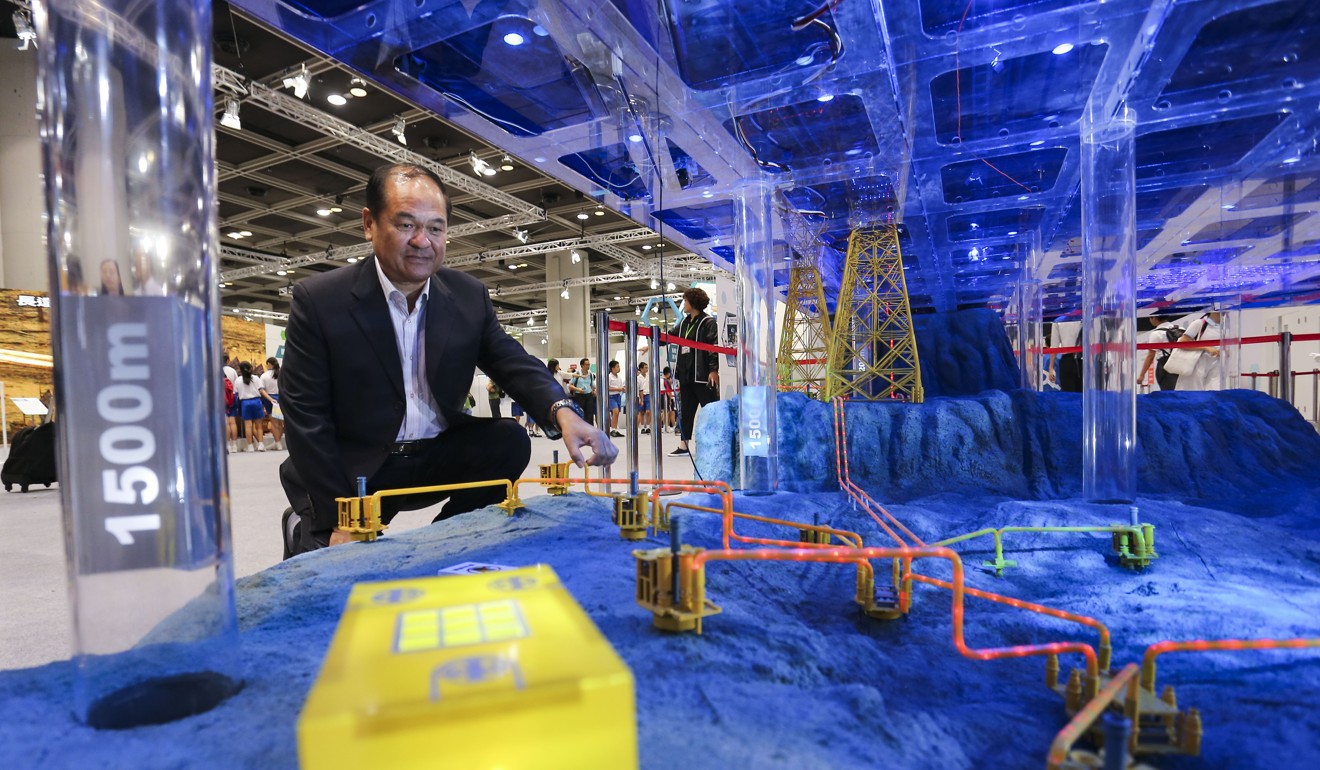
But a report by the local think tank has shown that Hong Kong, with only 0.73 per cent of gross domestic product dedicated to research and development, is lagging behind major Asian countries like Singapore (2.1 per cent), Korea (4 per cent), and the mainland (2.1 per cent).
The Post visited the fair and looked into some local efforts to boost Hong Kong’s competitiveness in science and technology as well as national endeavours to keep ahead of the game.
A six-foot mock-up of a super computer, named EarthLab, made its debut in the expo, standing in the exhibition hall alongside miniatures of China’s other major infrastructure projects. Construction of EarthLab, China’s first Earth system simulator – that collects and analyses information such as weather patterns, ocean currents and tectonic movements – is ongoing.
When complete, it will consist of tens of thousands of processors to handle big data from the atmosphere, lithosphere and hydrosphere.
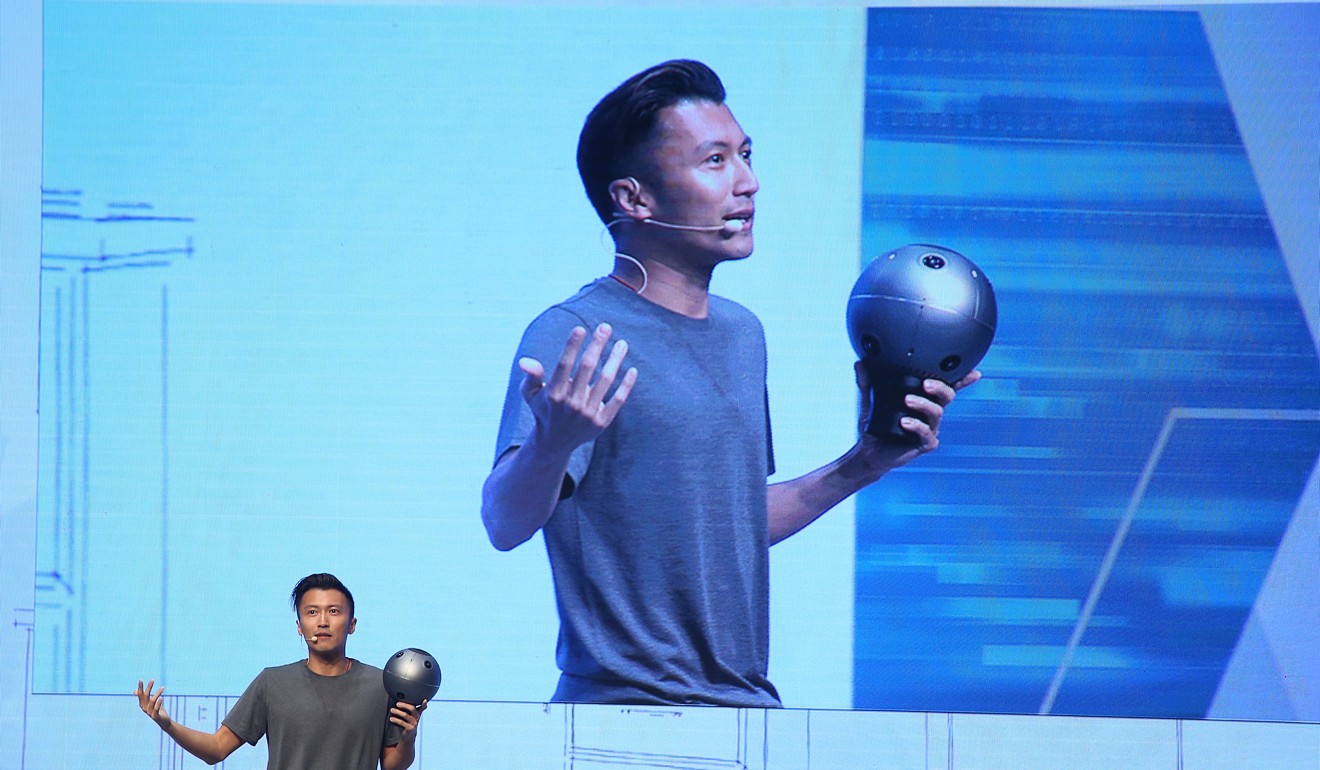
Tang Xiao, a Beijing scientist from the Chinese Academy of Science was stationed at the exhibition area to talk about the project with visitors and was impressed with their enthusiasm.
“I have a pretty good impression of the visitors,” he said. “One secondary student asked me a lot of hard-hitting questions, for example, about plate tectonics. I was so amazed by his interest that I gave him a little present.”
He said the simulator will be valuable to understanding global climate change as it can simulate the retreating of glaciers under current atmospheric conditions.
“The simulator utilises the big data collected from satellites, different sensors on the road and in the sea,” Tang Xiao said. “It will be able to make better predictions of imminent natural disasters.”
Expected to be completed in 2021, the project will elevate China to a par with countries like the USA, Japan and Germany, which all have their own earth system simulators.
“We hope this fair gives an opportunity to Hong Kong people to understand the nation’s latest developments,” said Julian Kwan Chung-yin, one of the organisers. “Therefore, they can develop a sense of pride and belonging for the country.”
“This event is also a great opportunity for me to learn more about Hong Kong. I see many practical and humane inventions by Hong Kong people. Very fascinating,” Tang said.
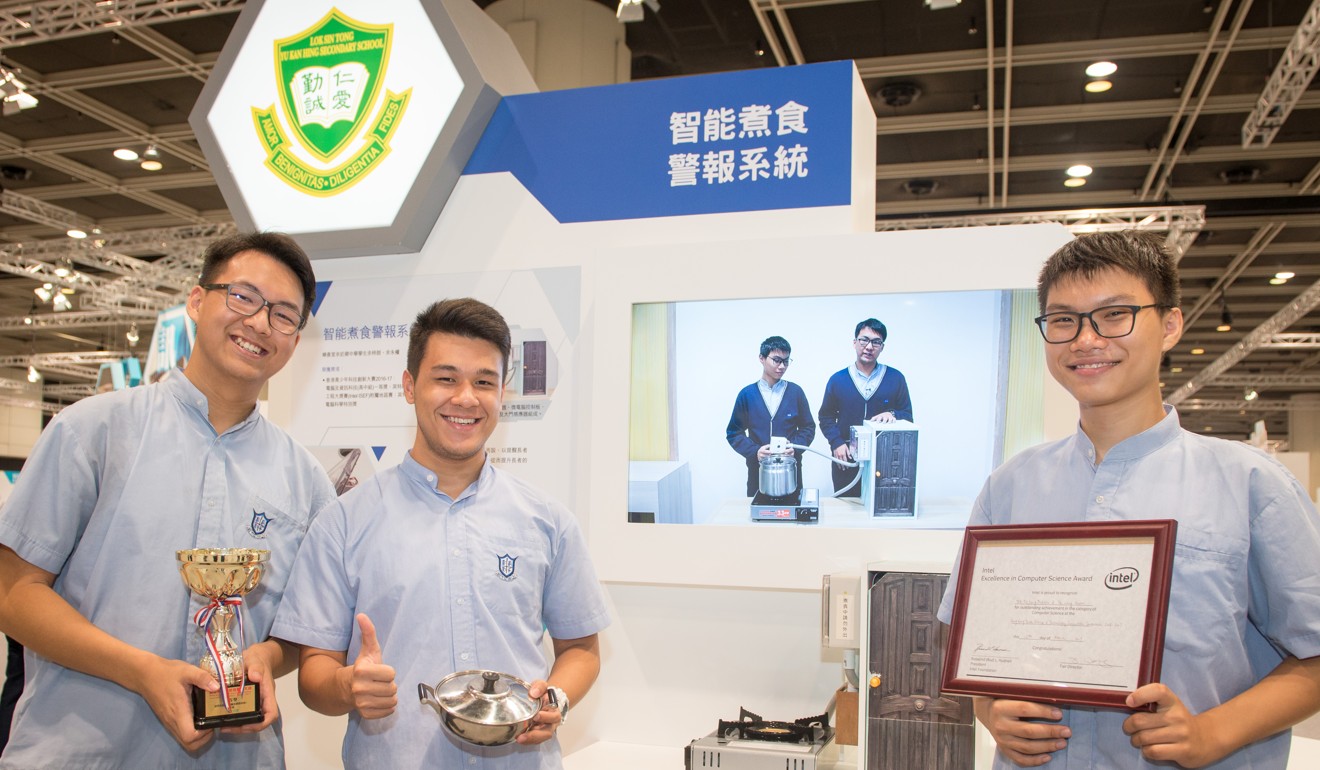
Secondary school students save your lunch
Have you ever walked away and forgotten about a boiling broth on the stove? Been distracted and ended up with overcooked food, or worse still, a fire in the kitchen?
A group of three Hong Kong secondary school pupils have come up with a device aimed at solving this household problem – the award-winning Smart Stove Alert.
The trio of Form Six pupils from Lok Sin Tong Yu Kan Hing Secondary School in Wong Tai Sin invented the device using widely available materials such as infrared sensors and alarm sirens, at a cost of just HK$150.
Activated by the heat of the fire from a stove, the alarm will go off if the flame is left unattended for a pre-set period. Another alarm is affixed to the door of the flat. If the cook intends to leave the house while the fire is on, the alert system will also be activated.
“I learned a lot about the problems of the elderly in Hong Kong in my Liberal Studies classes,” said Patrick Yu Wing-kuen, 17, one of the inventors. “I hope to help improve safety for elderly people, especially those living alone. So I came up with this idea.”
The three said they were delighted the device had received positive feedback from visitors at the Innotech Expo held in Wan Chai this week, where they discussed possible collaboration with Hong Kong gas supplier Towngas.
“They have grown a lot since embarking on this project a year ago,” vice-principal of the school Evy Cheung Tsai-yan said.
“Exhibitions like this enable them to present their ideas to visitors from various backgrounds and receive instant feedback to help perfect their own inventions ... The pupils are also much braver and more eloquent than before.”
Smart Stove Alert is one of 20 award-winning Hong Kong inventions – five of which are by secondary students – on display at the expo.
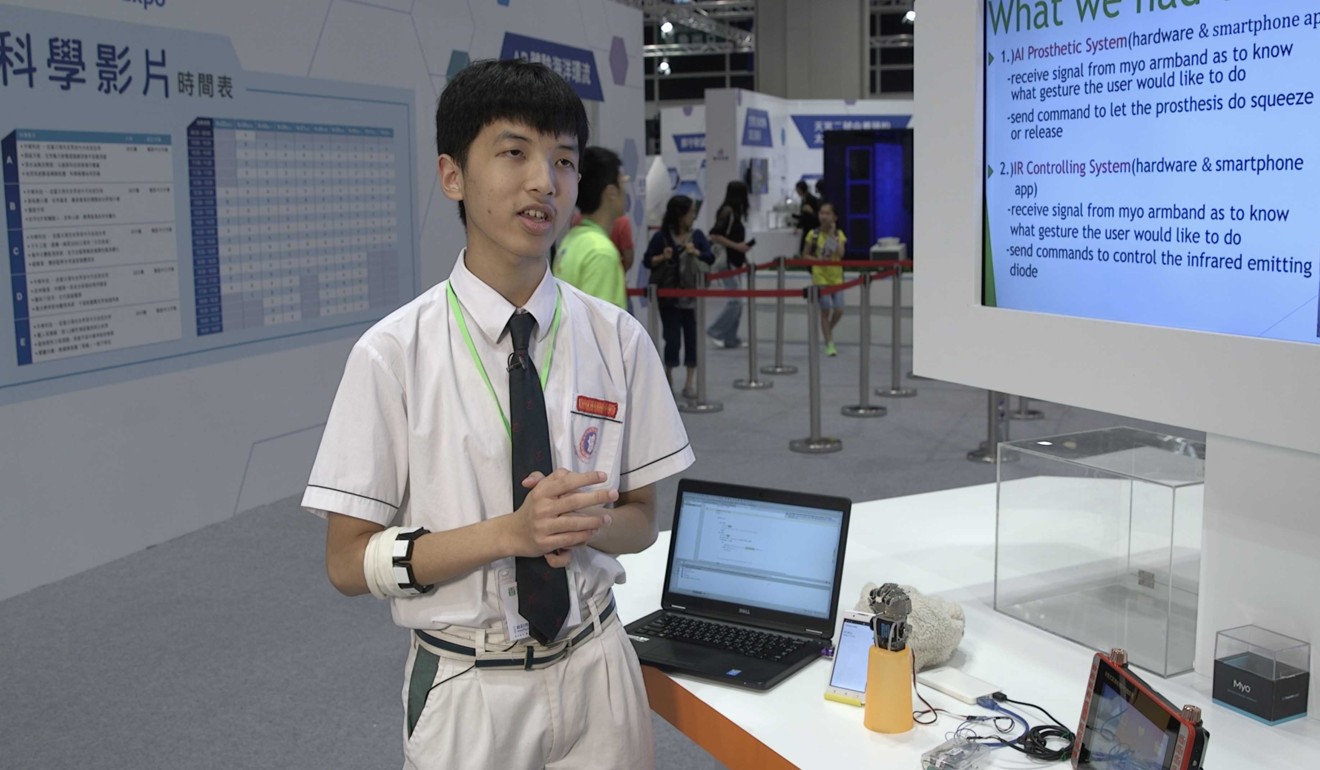
Electromyo Prosthesis and Controlling System
For the past six months, Form Five pupil William Wong Wing-lam has spent more than 20 hours a week on an invention that began with an “eureka” moment.
Asked in class to come up with an idea to help the needy, Wong recalled reading about hand amputees in the news and decided to do something for them.
The 17-year-old spent time on top of his studies designing and making a prosthetic palm, controlled by the muscle movements at the tip of an amputated arm. The contraption can perform simple movements like holding a fist and waving.
He even programmed a mobile app that enables remote control functions in the palm for electronics like the television.
For example, waving the prosthetic hand in a certain pattern will signal an app to turn on the television. Wong earned various awards in Hong Kong and overseas for his invention.
“I learned some basic app programming techniques from class but I deepened my knowledge by reading reference books and researching online,” the pupil from Shun Tak Fraternal Association Yung Yau College said. “I’m glad I can apply what I learned to this invention.”
For a decade, the school in Yuen Long has had a curriculum for science, technology, engineering and mathematics (STEM) subjects, encouraging students to innovate and come up with their own inventions.
Kwok Tsz-kit, information and communications technology teacher at the school, said of Wong: “He has showed skills and knowledge that are far beyond what I taught him.”
“I’m very impressed with his dedication and determination to help the disabled.”
Kwok said the school benefited from government funds for its STEM education, including a grant of HK$7.5 million over eight years under the Enriched IT Programme.
The move was part of a pledge by authorities to promote STEM learning in local schools to prepare pupils for future careers in the burgeoning IT industry.

